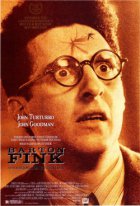
Barton Fink Page #2
- R
- Year:
- 1991
- 116 min
- 608 Views
BARTON:
To see pap.GARLAND
Yes, generally, to see pap. However, point number two: A
brief tenure in Hollywood could supprt you through the
writing of any number of plays.
BARTON:
I don't know, Garland; my place is here right now. I feel
I'm on the brink of success-
GARLAND:
I'd say you're already enjoying some.
Barton leans earnestly forward.
BARTON:
No, Garland, don't you see? Not the kind of success where
the critics fawn over you or the producers like Derek make
a lot of money. No, a real success - the success we've been
dreaming about - the creation of a new, living theater of,
about, and for the common man! If I ran off to Hollywood
now I'd be making money, going to parties, meeting
the big shots, sure, but I'd be cutting myself off from the
wellspring of that success, from the common man.
He leans back and chuckles ruefully.
. . . I guess I'm sprouting off again. But I am certain of
this, Garland:
I'm capable of more good work. Maybebetter work than I did in Choirs. It just doesn't seem to
me that Los Angeles is the place to lead the life of mind.
GARLAND:
Okay Barton, you're the artist, I'm just the ten perceter.
You decide what you want and I'll make it happen. I'm
only asking that your decision be informed by a little
realism - if I can use that word and Hollywood in the
same breath.
Barton glumly lights a cigarette and gazes out across the floor. Garland
studies him.
. . . Look, they love you, kid - everybody does. You see
Caven's review in the Herald?
BARTON:
No, what did it say?
GARLAND:
Take my copy. You're the toast of Broadway and you have
the opportunity to redeem that for a little cash - strike
that, a lot of cash.
Garland looks at Barton for a reaction, but gets none.
. . . The common man'll still be here when you get back.
What the hell, they might even have one or two of 'em
out in Hollywood.
Absently:
BARTON:
. . . That's a rationalization, Garland.
Garland smiles gently.
GARLAND:
Barton, it was a joke.
We hear a distant rumble. It builds slowly and we cut to:
A GREAT WAVE:
Crushing against the Pacific shore.
The roar of the surf slips away as we dissolve to:
HOTEL LOBBY:
A high wide shot from the front door, looking down across wilting potted
palms, brass cuspidors turning green, ratty wing chairs; the fading decor
is deco-gone-to-seed.
Amber light, afternoon turning to evening, slopes in from behind us, washing
the derelict lobby with golden highlights.
Barton Fink enters frame from beneath the camera and stops in the middle
foreground to look across the lobby.
We are framed on his back, his coat and hat. The lobby is empty. There is
a suspended beat as Barton takes it in.
Barton moves toward the front desk.
THE REVERSE:
As Barton stops at the empty desk. He hits a small silver bell next to the
register. Its ring-out goes on and on without losing volume.
After a long beat there is a dull scuffle of shoes on stairs. Barton,
puzzled, looks around the empty lobby, then down at the floor behind the
front desk.
A TRAP DOOR:
It swings open and a young man in a faded maroon uniform, holding a
shoebrush and a shoe - not one of his own - climbs up from the basement.
He closes the trap door, steps up to the desk and sticks his finger out to
touch the small silver bell, finally muting it.
The lobby is now silent again.
CLERK:
Welcome to the Hotel Earle. May I help you,
sir?
BARTON:
The clerk flips through cards on the desk.
CLERK:
F-I-N-K. Fink, Barton. That must be you,
huh?
BARTON:
Must be.
CLERK:
Okay then, everything seems to be in order.
Everything seems to be in order.
He is turning to a register around for Barton to sign.
. . . Are you a tranz or a rez?
BARTON:
Excuse me?
CLERK:
Transient or resident?
BARTON:
I don't know...I mean, I'll be here, uh,
indefinitely.
CLERK:
Rez. That'll be twenty-five fifty a week
payable in advance. Checkout time is twelve
sharp, only you can forget that on account
you're a rez. If you need anything, anything
at all, you dial zero on your personal in-room
telephone and talk to me. My name is Chet.
BARTON:
Well, I'm going to be working here, mostly at
night; I'm a writer. Do you have room service?
CLERK:
Kitchen closes at eight but I'm the night clerk.
I can always ring out for sandwiches.
The clerk is scribbling something on the back of an index card.
. . . Though we provide privacy for the
residential guest, we are also a full service
hotel including complimentary shoe shine. My
name Chet.
He pushes a room key across the counter on top of the index card.
Barton looks at the card.
On it:
"CHET!"Barton looks back up at the clerk. They regard each other for a beat.
CLERK:
. . . Okay
BARTON:
Huh?
The clerk.
CLERK:
Okey-dokey, go ahead.
BARTON:
What -
CLERK:
Don't you wanna go to your room?!
Barton stares at him.
BARTON:
. . . What number is it?
The clerk stares back.
CLERK:
. . . Six-oh-five. I forgot to tell
you.
As Barton stoops to pick up his two small bags:
. . . Those your only bags?
BARTON:
The clerk leans over the desk to call after him:
CLERK:
I'll keep an eye out for them. I'll
keep my eyes peeled, Mr. Fink.
Barton is walking to the elevator.
ELEVATOR:
Barton enters and sets down his bags.
An aged man with white stubble, wearing a greasy maroon uniform, sits on a
stool facing the call panel. He does not acknowledge Barton's presence.
After a beat:
BARTON:
. . . Six, please.
The elevator man gets slowly to his feet. As he pushes the door closed:
ELEVATOR MAN:
Next stop:
Six.SIXTH-FLOOR HALLWAY
Barton walks slowly toward us, examining the numbers on the doors.
The long, straight hallway is carpeted with an old stained forest green
carpet. The wallpaper shows faded yellowing palm trees.
Barton sticks his key in the lock of a door midway down the hall.
HIS ROOM:
As Barton enters.
The room is small and cheaply furnished. There is a lumpy bed with a worn-
yellow coverlet, an old secretary table, and a wooden luggage stand.
As Barton crosses the room we follow to reveal a sink and wash basin, a
house telephone on a rickety night stand, and a window with yellowing sheers
looking on an air shaft.
Barton throws his valise onto the bed where it sinks, jittering. He shrugs
off his jacket.
Pips of sweat stand out on Barton's brow. The room is hot.
He walks across the room, switches on an oscillating fan and struggles to
throw open the window. After he strains at it for a moment, it slides open
with a great wrenching sound.
Barton picks up his Underwood and places it on the secretary table. He
gives the machine a casually affectionate pat.
Next to the typewriter are a few sheets of house stationary: THE HOTEL EARLE:
A DAY OR A LIFETIME.
We pan up to a picture in a cheap wooden frame on the wall above the desk.
A bathing beauty sits on the beach under a cobalt blue sky. One hand
shields her eyes from the sun as she looks out at a crashing surf.
Translation
Translate and read this script in other languages:
Select another language:
- - Select -
- 简体中文 (Chinese - Simplified)
- 繁體中文 (Chinese - Traditional)
- Español (Spanish)
- Esperanto (Esperanto)
- 日本語 (Japanese)
- Português (Portuguese)
- Deutsch (German)
- العربية (Arabic)
- Français (French)
- Русский (Russian)
- ಕನ್ನಡ (Kannada)
- 한국어 (Korean)
- עברית (Hebrew)
- Gaeilge (Irish)
- Українська (Ukrainian)
- اردو (Urdu)
- Magyar (Hungarian)
- मानक हिन्दी (Hindi)
- Indonesia (Indonesian)
- Italiano (Italian)
- தமிழ் (Tamil)
- Türkçe (Turkish)
- తెలుగు (Telugu)
- ภาษาไทย (Thai)
- Tiếng Việt (Vietnamese)
- Čeština (Czech)
- Polski (Polish)
- Bahasa Indonesia (Indonesian)
- Românește (Romanian)
- Nederlands (Dutch)
- Ελληνικά (Greek)
- Latinum (Latin)
- Svenska (Swedish)
- Dansk (Danish)
- Suomi (Finnish)
- فارسی (Persian)
- ייִדיש (Yiddish)
- հայերեն (Armenian)
- Norsk (Norwegian)
- English (English)
Citation
Use the citation below to add this screenplay to your bibliography:
Style:MLAChicagoAPA
"Barton Fink" Scripts.com. STANDS4 LLC, 2025. Web. 21 Jan. 2025. <https://www.scripts.com/script/barton_fink_692>.




Discuss this script with the community:
Report Comment
We're doing our best to make sure our content is useful, accurate and safe.
If by any chance you spot an inappropriate comment while navigating through our website please use this form to let us know, and we'll take care of it shortly.
Attachment
You need to be logged in to favorite.
Log In